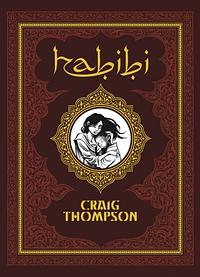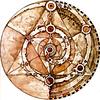Take a photo of a barcode or cover
More of a 3 1/2... Better than [b:Blankets|25179|Blankets|Craig Thompson|http://photo.goodreads.com/books/1327627384s/25179.jpg|781193] for sure. The art is stunning, the whole book is beautiful. The story is epic, at times funny, at times devastating.. but there is still something really uncomfortable and kind of wrong about the characters' complicated semi-religious attitude towards sex and love.
Amazing but sad. Thompson is an amazing artist with a strong, insightful voice. I wish I could teach this but the sex is a little much. Rape plays a large role in this story and while it is difficult to stomach it is still a wonderful story. I would suggest it to anyone who is searching.
I don't know where to begin. A beautiful book, but seriously, wtf?
I absolutely loved this book. There are at least three moments where I either cried or wanted to and restrained myself because I was in public. I want to touch and caress this book forever, and if I died with it in my arms I'd be happy. There are a lot of legitimate issues with it, though.
At its heart, Habibi is a love story between a woman in an Islamic/Arabian setting and a boy she helped raise into adulthood (and manhood in particular) The world is harsh, of course the "best" way to demonstrate a craptastic world is through rape and slavery, so.... But the two get split and reunite after six years of discovery and tragedy.
Reasons I love this book:
* The art is gorgeous. It's one of the most beautifully drawn books I've ever seen.
* Having grown up in the middle east and being a person of colour myself, books that centre on people like me are really appealing even if I'm not middle eastern or from northern Africa myself.
* I have a soft spot for books that deal with religion, having grown up Catholic in an Islamic world.
* The book in many ways covers a lot of women's issues (I don't want to say feminist, it's not my place) and more importantly for me, covers a man dealing with his own manhood in relation to the treatment of women. In some ways the man's narration mirrors, for good or ill, the journey I've had to make as a cis dude of colour who supports feminism.
* The subtle revelation of, is very subtle and very powerful. It's amazing when and how you see it revealed.
Criticisms of the book:
* The author is a white North American male. Don't get me wrong, he researched heavily and wasn't just talking out of his ass. But at the same time, even the few parts of the book that dealt with Indian culture, as an Indian I was like that's an interesting spin you have on it, accurate but...
* The book is orientalist, it feels like a survey of Islamic features with none of the subtlety that someone who actually lived there (Having lived in Saudi, I can probably say that with a miniscule sense of authority.) Comparing this book to something like [b:Persepolis|9522|Persepolis, Volume 1 (Persepolis, #1)|Marjane Satrapi|https://d.gr-assets.com/books/1375777630s/9522.jpg|25686510] or [b:Reading Lolita in Tehran|7603|Reading Lolita in Tehran|Azar Nafisi|https://d.gr-assets.com/books/1397751318s/7603.jpg|903067] shows a lot of nuance from people who understand the day to day rather than an implicit comparison to Eurocentric backings.
* As said above, while I sort of get that sexuality was an important part of the book, it felt more like the various rapes in the book were to make men feel uncomfortable in a narratively-sloppy way, in many ways reducing the woman to a story for men to change. While I think that there were some powerful moments, the amount of it felt de-sensitizing. This being said, I'm a pro-feminist dude, so what do I know.
* While I get that there were purposeful neologisms in the book to offset the serious tone, some of the casual affections of the African characters seemed a bit ... reductive and trite and reducing people down to a stereotype.
* This book gladly displays women nude and vulnerable in all sorts of nasty positions, but the few times it is important for a man to show his penis, nothing (or it's so hidden as to be virtually non-existent.)
All in all, I felt the book was incredibly ambitious and it failed a lot. But at least it tried and I'm glad it can be educational even in a critical form. While it's obviously better of women and people of colour write about their own experiences themselves (and that we as a society support that), for a book written by a white male cis comic book author, I think this book did a really good job.
At its heart, Habibi is a love story between a woman in an Islamic/Arabian setting and a boy she helped raise into adulthood (and manhood in particular) The world is harsh, of course the "best" way to demonstrate a craptastic world is through rape and slavery, so.... But the two get split and reunite after six years of discovery and tragedy.
Reasons I love this book:
* The art is gorgeous. It's one of the most beautifully drawn books I've ever seen.
* Having grown up in the middle east and being a person of colour myself, books that centre on people like me are really appealing even if I'm not middle eastern or from northern Africa myself.
* I have a soft spot for books that deal with religion, having grown up Catholic in an Islamic world.
* The book in many ways covers a lot of women's issues (I don't want to say feminist, it's not my place) and more importantly for me, covers a man dealing with his own manhood in relation to the treatment of women. In some ways the man's narration mirrors, for good or ill, the journey I've had to make as a cis dude of colour who supports feminism.
* The subtle revelation of
Spoiler
the setting, where it turns out this is not set in the past but in the future due to environmental issuesCriticisms of the book:
* The author is a white North American male. Don't get me wrong, he researched heavily and wasn't just talking out of his ass. But at the same time, even the few parts of the book that dealt with Indian culture, as an Indian I was like that's an interesting spin you have on it, accurate but...
* The book is orientalist, it feels like a survey of Islamic features with none of the subtlety that someone who actually lived there (Having lived in Saudi, I can probably say that with a miniscule sense of authority.) Comparing this book to something like [b:Persepolis|9522|Persepolis, Volume 1 (Persepolis, #1)|Marjane Satrapi|https://d.gr-assets.com/books/1375777630s/9522.jpg|25686510] or [b:Reading Lolita in Tehran|7603|Reading Lolita in Tehran|Azar Nafisi|https://d.gr-assets.com/books/1397751318s/7603.jpg|903067] shows a lot of nuance from people who understand the day to day rather than an implicit comparison to Eurocentric backings.
* As said above, while I sort of get that sexuality was an important part of the book, it felt more like the various rapes in the book were to make men feel uncomfortable in a narratively-sloppy way, in many ways reducing the woman to a story for men to change. While I think that there were some powerful moments, the amount of it felt de-sensitizing. This being said, I'm a pro-feminist dude, so what do I know.
* While I get that there were purposeful neologisms in the book to offset the serious tone, some of the casual affections of the African characters seemed a bit ... reductive and trite and reducing people down to a stereotype.
* This book gladly displays women nude and vulnerable in all sorts of nasty positions, but the few times it is important for a man to show his penis, nothing (or it's so hidden as to be virtually non-existent.)
All in all, I felt the book was incredibly ambitious and it failed a lot. But at least it tried and I'm glad it can be educational even in a critical form. While it's obviously better of women and people of colour write about their own experiences themselves (and that we as a society support that), for a book written by a white male cis comic book author, I think this book did a really good job.
My brain cannot comprehend how much work went into this graphics novel. Every page is covered with painstaking detail and beauty. Learned a lot about Islamic history and mythology.
Spellbinding artwork mixed wonderfully with Abrahamic parables and myths amid the background of a gut-wrenchingly sad storyline.
Really enjoyed this. It was gorgeously done. However, I did find the treatment of sexuality a bit problematic. Um. But it was really lovely otherwise.
Books like this prove that graphic novels are literature. Truly.
Love this book, Craig Thompson spins and draws a good tale. Makes me want to learn Arabic.
dark
slow-paced
Plot or Character Driven:
Character
Strong character development:
No
Loveable characters:
No
Diverse cast of characters:
Complicated
Flaws of characters a main focus:
Yes
This graphic novel manages to throw all stereotypes about the arab region and muslim culture in a blender, just to have the orientalist vibe it's supposed to have. The cover and the art made me want to read this work, but the plot and story made me want to stop reading it.
Graphic: Body horror, Child death, Racial slurs, Rape, Sexual assault, Sexual violence, Slavery, Islamophobia, Medical content, Cultural appropriation, Colonisation, Classism





